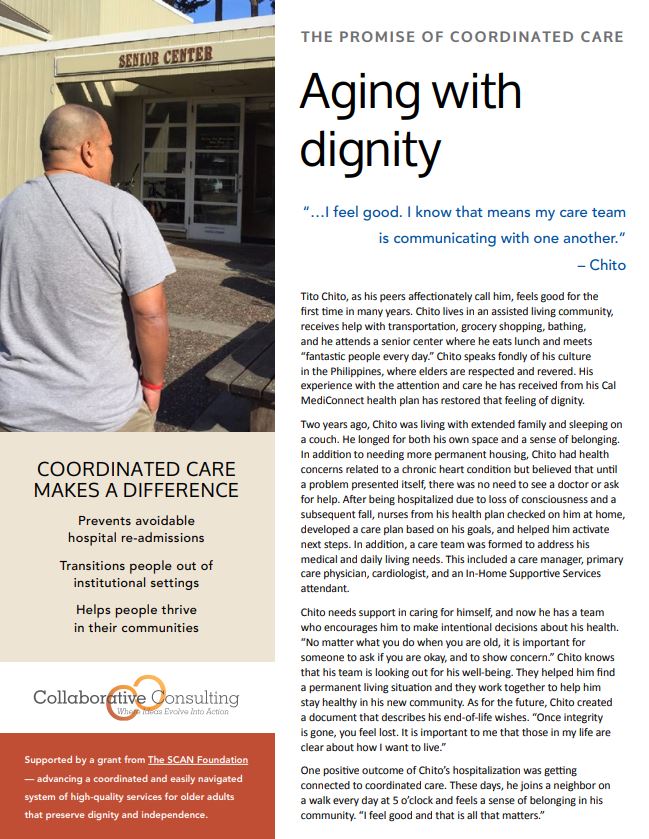The Promise of Coordinated Care: Chito’s Story
summary
Coordinated Care Makes a Difference. It prevents avoidable hospital re-admissions, transitions people out of institutional settings and helps people thrive in their communities. Read Chito’s case study.
Date Updated: 01/14/2016The Promise of Coordinated Care
Aging with dignity
Tito Chito, as his peers affectionately call him, feels good for the first time in many years. Chito lives in an assisted living community, receives help with transportation, grocery shopping, bathing,
and he attends a senior center where he eats lunch and meets “fantastic people every day.” Chito speaks fondly of his culture in the Philippines, where elders are respected and revered. His
experience with the attention and care he has received from his Cal MediConnect health plan has restored that feeling of dignity.
“…I feel good. I know that means my care team is communicating with one another.” – Chito
Two years ago, Chito was living with extended family and sleeping on a couch. He longed for both his own space and a sense of belonging. In addition to needing more permanent housing, Chito had health concerns related to a chronic heart condition but believed that until a problem presented itself, there was no need to see a doctor or ask for help. After being hospitalized due to loss of consciousness and a subsequent fall, nurses from his health plan checked on him at home, developed a care plan based on his goals, and helped him activate next steps. In addition, a care team was formed to address his medical and daily living needs. This included a care manager, primary care physician, cardiologist, and an In-Home Supportive Services attendant.
Chito needs support in caring for himself, and now he has a team who encourages him to make intentional decisions about his health. “No matter what you do when you are old, it is important for
someone to ask if you are okay, and to show concern.” Chito knows that his team is looking out for his well-being. They helped him find a permanent living situation and they work together to help him stay healthy in his new community. As for the future, Chito created a document that describes his end-of-life wishes. “Once integrity is gone, you feel lost. It is important to me that those in my life are clear about how I want to live.” One positive outcome of Chito’s hospitalization was getting connected to coordinated care. These days, he joins a neighbor on a walk every day at 5 o’clock and feels a sense of belonging in his community. “I feel good and that is all that matters.”
Download the publication for all visuals and complete references.
Continue Reading
This policy brief provides an introduction to The SCAN Foundation’s CLASS Technical Assistance Brief Series, which explores many of the critical issues to be considered for successfully implementing CLASS.
This policy brief describes the broad needs of individuals with disability and the wide range of supportive and environmental solutions that can allow for the most independent living possible. It suggests how findings on social and environmental supports for individuals with disability can inform implementation of CLASS.
This policy brief provides background on the historical development of benefit eligibility triggers in the private long-term care insurance market. Understanding how these triggers came into being can provide important information to those charged with implementing the CLASS Plan.


